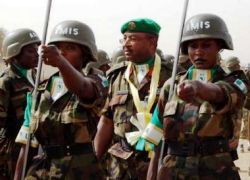Sudan under pressure to accept hybrid force next week
June 6, 2007 (UNITED NATIONS) — Sudan will come under pressure at a tripartite meeting in Addis Ababa next week to allow the deployment of a joint African Union-UN force in Darfur, a senior UN official said Wednesday.
 The official, who asked not to be named, said the United Nations and the AU would meet in the Ethiopian capital with Sudanese representatives next Monday and Tuesday to weigh a revised deal they reached to send a “hybrid,” 23,000-strong peacekeeping force to Darfur.
The official, who asked not to be named, said the United Nations and the AU would meet in the Ethiopian capital with Sudanese representatives next Monday and Tuesday to weigh a revised deal they reached to send a “hybrid,” 23,000-strong peacekeeping force to Darfur.
The agreement, which was sealed Wednesday and forwarded to the UN Security Council, the AU Peace and Security Council and Khartoum for endorsement, featured minor changes to a deal first unveiled late last month.
At issue is who will have overall control of the joint force that is to take over peacekeeping from 7,000 under-equipped and underfunded AU troops in Darfur.
Khartoum wants the AU in charge of the operation while the UN insists it must handle command and control, in line with all its peacekeeping preocedures.
The new compromise text reaffirmed that “unity of command and control is a basic principle of peacekeeping,” and recalled that a November agreement on the so-called “hybrid” AU-UN force stipulated that “backstopping and command and control structures for the hybrid operation will be provided by the UN.”
“We have to convince the government of Sudan that this is the way to go,” the UN official said, stressing that the accord was “a sound basis for a way out of the crisis.”
He said the Security Council would be briefed next Wednesday on the outcome of the Addis Ababa meeting, a day before a council team is due to depart on a week-long African tour, including stops in the Ethiopian capital and Khartoum, for crucial talks on Darfur peacekeeping.
Sudanese Foreign Minister Lam Akol, meanwhile, warned that the latest US sanctions against his country would “harm the peaceful process as well as the Darfur people,” and came just as Khartoum was preparing to thrash out the details of the joint UN-AU force.
“Definitely everybody’s perplexed and surprised as to why such a decision would come at this particular time when we are about to finalize what was asked of all of us to do,” Akol told reporters at Washington’s National Press Club via video-link from Khartoum.
In late May, US President George W. Bush tightened US sanctions on Sudan over the “genocide” in Darfur and pushed for a tough, new UN Security Council resolution to punish Khartoum for the Darfur bloodshed.
The UN official here, meanwhile, said the world body hoped to send the vanguard of a 3,000-strong contingent to Darfur in August to provide logistical support to the struggling AU force.
That contingent, whose dispatch has been approved by Khartoum, is to provide the “backbone” of the joint UN-AU force, which under the best circumstances will not be able to deploy until next year, he said.
“Our hope is we would begin deploying (the first elements of the so-called 3,000-strong heavy support package) some time in August or maybe September,” the UN official said.
“Hopefully the bulk of the heavy support package will be in place by the end of the year,” he added.
The UN official said member states offered to contribute troops for most of the specialized units required for the heavy support package “except for the air assets.”
He added that two African and two non-African unidentified countries offered to provide six of the 11 units needed for the logistical support operation.
He underscored the urgency of continued international financing for the cash-strapped AU force, whose Darfur mandate expires at the end of this month but will have to be extended.
The conflict there began in 2003 when an ethnic minority rose up against the Arab-dominated government in Khartoum, which then enlisted the Janjaweed militia group to help crush the rebellion.
It has cost at least 200,000 lives and forced more than two million people from their homes, according to the United Nations, though Khartoum contests those estimates, saying 9,000 people have died.
(AFP)
